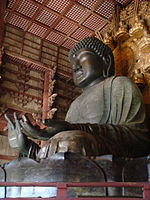Ucchusma

Ucchuṣma (Chinese and Japanese phonetic translations: 烏枢沙摩明王, 烏枢瑟摩明王, 烏瑟沙摩明王 or 烏芻沙摩明王, Japanese: Ususama Myōō; Chinese significant name: 除穢金剛 Chúhuì Jīngāng, lit. Vajra purifying the unclean) is a vidyaraja (wisdom king) in the Vajrayana sect of Buddhism. He is also known by various other names such as Burning Impurity Kongo, Jusoku Kongo (受触金剛) and Kazu Kongo (火頭金剛).
His full name is Great Strength Furious Diamond Ucchuṣma, in Sanskrit "Vajra Krodha Mahābala Ucchuṣma", in Chinese 大力威怒金刚烏芻使摩 (Dàlì wēinù jīngāng Wūchúshǐmó), from the Chinese version of the Sūtra of Mahābala and the Tibetan version of the Ārya Mahābala-Nāma-Mahāyāna Sūtra.
In Japan, Ucchuṣma is a guardian of the bathroom, where his effigy is often present. He is known to the general public for his powers of purification of the unclean,[1] in particular in respect to sexual diseases.[2][3]
Ucchuṣma was also thought to be able to change a female fetus into a male one.[1]
His method to attain the enlightenment
According to the Shurangama Sutra, Shakyamuni Buddha asked the bodhisattvas and arahants to present their methods to understand the ultimate truth, the eighteenth to present his character was Ucchusma. The sutra states:
"Ucchushma came before the Buddha, put his palms together, bowed at the Buddha’s feet, and said to the Buddha, I can still remember how many kalpas ago I was filled with excessive greed and desire. There was a Buddha in the world named King of Emptiness. He said that people with too much desire turn into a raging mass of fire. He taught me to contemplate the coolness and warmth throughout my entire body. A spiritual light coalesced inside and transformed my thoughts of excessive lust into the fire of wisdom. After that, when any of the Buddhas summoned me, they used the name 'fire-head.' From the strength of the fire-light samadhi, I accomplished Arhatship. I made a great vow that when each of the Buddhas accomplishes the way, I will be a powerful knight and in person subdue the demons' hatred. The Buddha asks about perfect penetration. I used attentive contemplation of the effects of heat in my body and mind, until it became unobstructed and penetrating and all my outflows were consumed. I produced a blazing brilliance and ascended to enlightenment. This is the foremost method."
The Ucchusma Vajrapala Sutra, on the other hand, asserts that the Ucchusma Deity is actually the Vajra manifestation of Shakyamuni Buddha. Legend has it that when Shakyamuni Buddha was about to enter into Nirvana, all heavenly beings, with the exception of the ‘Spiral Hair-knot Brahma King’, came to pay their respect to Buddha. The Brahman King was in fact enjoying himself with the heavenly maidens in his own celestial palace. The heavenly gods, being unhappy with the arrogance of the Brahma King, went to his abode and try to persuade him to attend the Dharma assembly. Upon reaching his palace however, the gods found themselves trapped in the defiled energy cast by the supernatural powers of the king. Even some of the Vajra Deities 金刚神 who were later sent to apprehend the Brahman King were imprisoned by the foul forces as well.
When Shakyamuni Buddha came to learn of this, He employed His Origin Wisdom, and the Light of Perpetual Joy and Pliancy was emitted from His heart. The Ucchusma Vajrapala 秽迹金刚 soon appeared from amidst the revolving radiance of the Buddha’s heart, and ascended to the celestial palace of the Brahma King. Despite the defiled energy hurled at Him by the Brahman King, the Ucchusma Deity was unharmed as He immediately turned these forces of contamination into ordinary soil. In no time, the Brahma King was subdued and brought to the feet of Shakyamuni Buddha. For this reason, the Ucchusma Deity is also known as the ‘Filth-eliminating Vajrapala’ 不净金刚.
See also
Notes
- ↑ 1.0 1.1 The Taiheiki: A Chronicle of Medieval Japan by Helen Craig McCullough p.12 [1]
- ↑ The other side of Zen: a social history of Sōtō Zen : Buddhism in Tokugawa Japan by Duncan Ryūken Williams, p.53 [2]
- ↑ The illustrated encyclopedia of Zen Buddhism by Helen Josephine Baroni p.355 [3]
- ↑ The Surangama Sutra with Commentary - Volume 5 - Explained by Venerable Master Hsuan Hua p.94 [4]
- ↑ Ucchusma Vajrapala Sutra [5]
